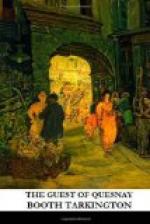She smiled in a pleasant, comprehending way, but neither directly replied nor made any return speech whatever; instead, she let her forearms rest on the broad railing of the marble balustrade, and, leaning forward, gazed out over the shining and mysterious slopes below. Somehow it seemed to me that her not answering, and her quiet action, as well as the thoughtful attitude in which it culminated, would have been thought “very like her” by any one who knew her well. “Cousin Louise has her ways,” Miss Elizabeth had told me; this was probably one of them, and I found it singularly attractive. For that matter, from the day of my first sight of her in the woods I had needed no prophet to tell me I should like Mrs. Harman’s ways.
“After the quiet you have had here, all this must seem,” I said, looking down upon the strollers, “a usurpation.”
“Oh, they!” She disposed of Quesnay’s guests with a slight movement of her left hand. “You’re an old friend of my cousins—of both of them; but even without that, I know you understand. Elizabeth does it all for her brother, of course.”
“But she likes it,” I said.
“And Mr. Ward likes it, too,” she added slowly. “You’ll see, when he comes home.”
Night’s effect upon me being always to make me venturesome, I took a chance, and ventured perhaps too far. “I hope we’ll see many happy things when he comes home.”
“It’s her doing things of this sort,” she said, giving no sign of having heard my remark, “that has helped so much to make him the success that he is.”
“It’s what has been death to his art!” I exclaimed, too quickly—and would have been glad to recall the speech.
She met it with a murmur of low laughter that sounded pitying. “Wasn’t it always a dubious relation—between him and art?” And without awaiting an answer, she went on, “So it’s all the better that he can have his success!”
To this I had nothing whatever to say. So far as I remembered, I had never before heard a woman put so much comprehension of a large subject into so few words, but in my capacity as George’s friend, hopeful for his happiness, it made me a little uneasy. During the ensuing pause this feeling, at first uppermost, gave way to another not at all in sequence, but irresponsible and intuitive, that she had something in particular to say to me, had joined me for that purpose, and was awaiting the opportunity. As I have made open confession, my curiosity never needed the spur; and there is no denying that this impression set it off on the gallop; but evidently the moment had not come for her to speak. She seemed content to gaze out over the valley in silence.
“Mr. Cresson Ingle,” I hazarded; “is he an old, new friend of your cousins? I think he was not above the horizon when I went to Capri, two years ago?”
“He wants Elizabeth,” she returned, adding quietly, “as you’ve seen.” And when I had verified this assumption with a monosyllable, she continued, “He’s an ‘available,’ but I should hate to have it happen. He’s hard.”




